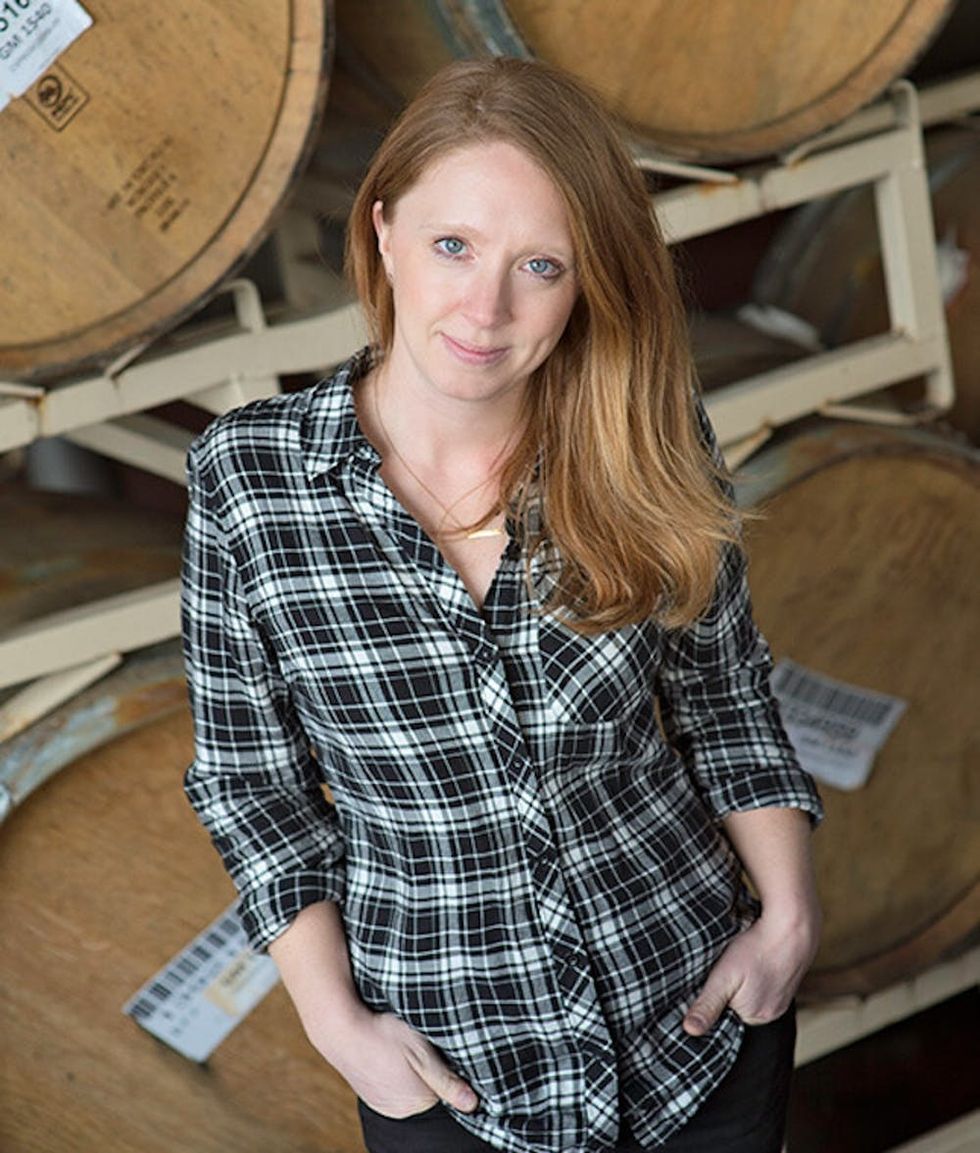Can we be them?
4 Women Who Are Leading the Way in the Wine Industry

Nine times out of 10, you never want to see shattered glass and wine in the same sentence. However, when you’re talking about women shattering the glass ceiling of the wine industry, it’s an entirely different thing. We’ve spoken with several creative, passionate, smart, and resourceful women in wine — from the winery-owning McBride sisters (whose story is truly magical) to the San Francisco sommelier Chaylee Priete — who are doing the hard work to diversify the male-dominated industry. One winery in particular, La Crema, is leading the charge as a woman-owned company employing women in their senior roles. We chatted with four of the extraordinary ladies from this winery to get their take on the challenges of being a woman in the field, the hectic harvest season, and sniffing spices in the grocery store.

Jen Walsh, winemaker

Brit + Co: How did you get started in wine? Was winemaking always something that interested you?
Jen Walsh: I came to winemaking a little later in life, and I have been making wine for over 15 years now. After working as a filmmaker for a few years, it finally occurred to me that winemaking could actually be a career path. I began working at a small Maryland winery, and then moved to California to get a graduate degree in Viticulture and Enology. The university provided a great foundation, but becoming a skilled winemaker takes a lot of training and hard work, and I worked with many small Pinot Noir producers around the world to learn the craft. Having diverse winemaking experiences with good mentors is essential, and I certainly use those skills every day at La Crema.
B+C: As a winemaker, we imagine your day-to-day drastically varies depending on the season. Is that true?
JW: In the summer, I spend most of my time outside, walking our vineyards to make sure they are healthy and to see how the grapes are maturing. Once harvest begins, much of my time is spent deciding when to bring grapes into the winery and what to do with them once they arrive. Most weeks during harvest, I’ll be up at 5am and in bed around 11pm. Tasting is also a big part of my job. I taste tanks of fermenting grapes, I taste barrels to see how the wine is developing, and then I will taste wines to decide how to blend them before bottling — it’s very much a “hands-on” job.
B+C: What’s a major misconception you’ve seen about women working in the wine industry?
JW: Much of the work in a cellar is very physical, and the environment can be cold, wet, and dirty. There are pumps and compressors, and all sorts of equipment that needs to be maintained or repaired. As a result, occasionally there is a misconception that women aren’t strong enough to do the job, or that we don’t have the aptitude to drive a forklift or repair a pump. For this reason, it seems that many women take jobs in the winery lab, which can perhaps mean that they may not have the same opportunity to broaden their winemaking skills.
B+C: What are some of your best wine tips for the novices among us?
JW: Many people seem to overbook themselves when visiting wine country. Wine tasting should be a fun and relaxing activity, and rushing around from one tasting appointment to another is stressful! I would select a maximum of three tasting rooms to visit, with a long, leisurely lunch in-between wineries.
Maura Mazzoni, tasting room manager
Brit + Co: Can you talk about your personal professional path that brought you to La Crema?
Maura Mazzoni: Growing up here in Sonoma County, I was very conscious of the unique and exceptional place I called home, and as I began college I knew that I wanted to work in an industry that afforded me the ability the stay, play, and be successful in Sonoma County. Graduating from Sonoma State University with a Bachelor’s degree in Business with a concentration in Wine Business Strategies seemed natural. Traveling the next two years for work during harvest in wine cellars from Chile to New Zealand and back to this area didn’t seem natural at all, but I was hooked on the lifestyle. Quickly realizing my winemaking skills were not as strong as my ability to convey the wines, regions, and people that are wine, I made the switch from cellar work to direct-to-consumer sales, and so began my journey in tasting rooms. Since returning from maternity leave, I have had the pleasure of overseeing the opening of the new La Crema Estate at Saralee’s Vineyard for the last year and a half.
Brit + Co: The wine industry is a mysterious one — it’s hard to know what jobs are available. It’s cool to see you putting a business degree to work at a winery. Can you tell us a little more about what a Tasting Room Manager does, day-to-day?
MM: As the Tasting Room Manager for our La Crema Estate, I am responsible for the day-to-day operations of one of the most iconic tasting rooms in the heart of the Russian River Valley. I am responsible for hiring and inspiring new wine educators, creating new guest experiences that showcase all 260 acres of our sustainably farmed Estate, sourcing cheese orders from local purveyors that highlight our wines, partnering with our culinary team to cater all exclusive La Crema Member events, as well as attend monthly business reviews to report out all updates regarding the DTC (direct-to-consumer) business with the winemaking, marketing, and executive teams.
B+C: What is one misconception you’ve seen about working in the wine industry?
MM: One of the biggest misconceptions about the wine industry is that “you will be rich if you work in wine.” Although some have seen major success in our industry, the true wealth of the wine industry comes in the form of a lifestyle. If you work in wine, you are a steward of the land that provides fruit to be enjoyed as a luxury. You are a farmer. You are the gatekeeper of vintages past and present. You are a historian. You are a local ambassador of adventures that should be discovered. You are a professional concierge. You are an educator. You are a memory maker. For me, all those things combined make those of us lucky enough to work in wine “rich,” indeed.
B+C: What are some of your best wine tips for the novices among us?
MM: Visit on a weekday and let your wine educator be your guide. A well-rounded tasting room associate with enough time will be able to establish your comfort with wine, detect what styles of wines you enjoy, how you enjoy them, and your desired price range within a few moments of greeting you. From there, your wine educator will quickly tailor their portfolio to best fulfill your needs and enhance your personalized tasting experience.
Debra Charest, Senior Brand Manager

Brit + Co: What exactly does a Senior Brand Manager do?
Debra Charest: At La Crema, I’m responsible for developing and executing national brand strategy, which includes forecasting, positioning, pricing, packaging, promotion, and a lot more. To do this, I get to work with all departments, from winemaking to sales, as well as the executive team and key members of the company. I also get to travel a bit for various reasons like market surveys, wholesaler education, and to meet with vendors in fun cities like NYC and Miami. I’m based in an office in Santa Rosa, California, but my favorite place to work is at the winery just down the road, with views of the vineyard, alongside our winemakers and tasting room teams who are interacting with our guests every day.
B+C: Before you got into wine, did you have any preconceived notions about the industry?
DC: Before I started working in the wine industry I thought that there were two types of wineries: tiny, mom and pop wineries that made 300-400 cases of each vintage; and huge conglomerate companies that mass-produced wine. In fact, there’s a wide spectrum of producers, making wine that appeals to all levels of consumers, from entry-level to esoteric. I’m so proud to work for a winery that leads with the vineyard, with a range of offerings that express the varying terroir of our estate vineyard sites from Sonoma Coast to Monterey and all the way up to the Willamette Valley in Oregon.
B+C: What are some of your best wine tips for the novices among us?
DC: My best advice is to ask for a recommendation! Whether you’re in a restaurant, a wine shop, or at a tasting, don’t hesitate to ask questions. And never decide that you don’t like a specific variety — the great thing about wine is that the same variety can be very different depending on many factors like where it’s grown, the vintage year, and the winemaker’s vision.
Samantha Poehlman, Assistant Winemaker

Brit + Co: Can you talk about your personal professional path that brought you to La Crema?
Samantha Poehlman: I went to school knowing that I wanted to do something in the Food Sciences. My Microbiology courses, in particular, piqued my interest, and I decided to focus my education on Fermentation Microbiology. After growing up in the Midwest, I decided it was time to try my hand at fermenting something other than dairy.
B+C: Is there a particular part of winemaking that you feel most passionate about?
SP: Throughout the fall, it’s “go time!” Harvest is always my favorite time of the year since it can only happen once annually, you only get one shot to get it right, and every year is a little different. And the most rewarding part of my job is watching the evolution of the grapes we’ve tended as they become wine through the fermentation process. I also really love the creative aspect that comes from blending trials, where we craft our final wines from a blend of different vineyards and plots.
B+C: We’ve asked your colleagues so we have to ask you too — what’s the biggest misconception about working in the wine industry?
SP: That we drink all day! And, yes, it really is work, haha.
B+C: What are some of your best wine tips for the novices among us?
SP: My best “insider” tip is, KEEP TASTING! Taste different teas, beers, spirits, foods, etc. Don’t limit yourself to just wine, or to just what you think you like. Taste with different people. Everyone has different experiences and perhaps has tasted or smelled something you haven’t, so build off of their vocabulary. Tasting is more intimidating than it should be. If someone uses an analogy of a food or spice that you haven’t been exposed to, jot it down and seek it out! I used to make a list and take it the grocery store and smell my way through the bulk spice section to calibrate my vocabulary and increase my arsenal of descriptions.
If you could work in any area of the wine industry, what would it be? Tweet us @BritandCo and let us know what you’d do!
(Photos via La Crema Winery)


















